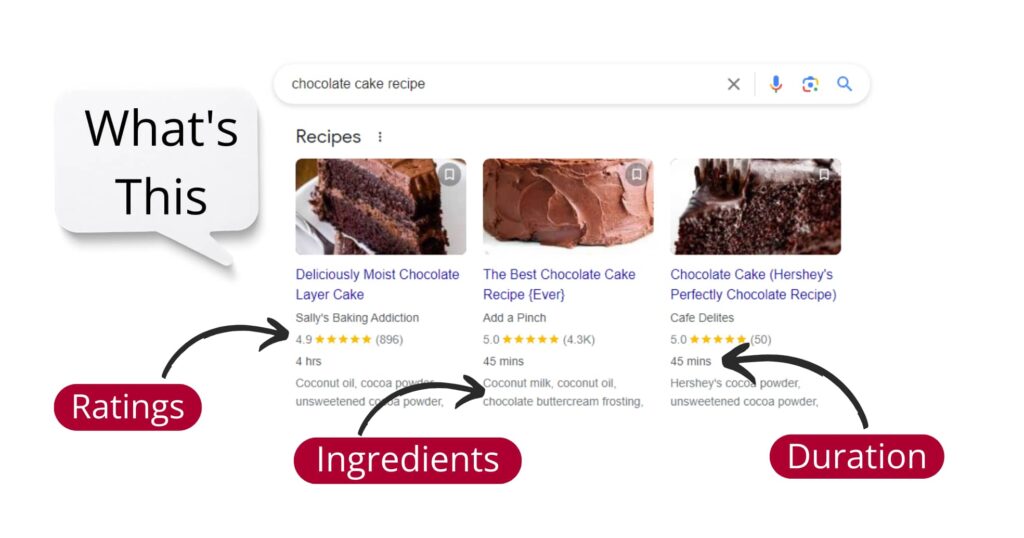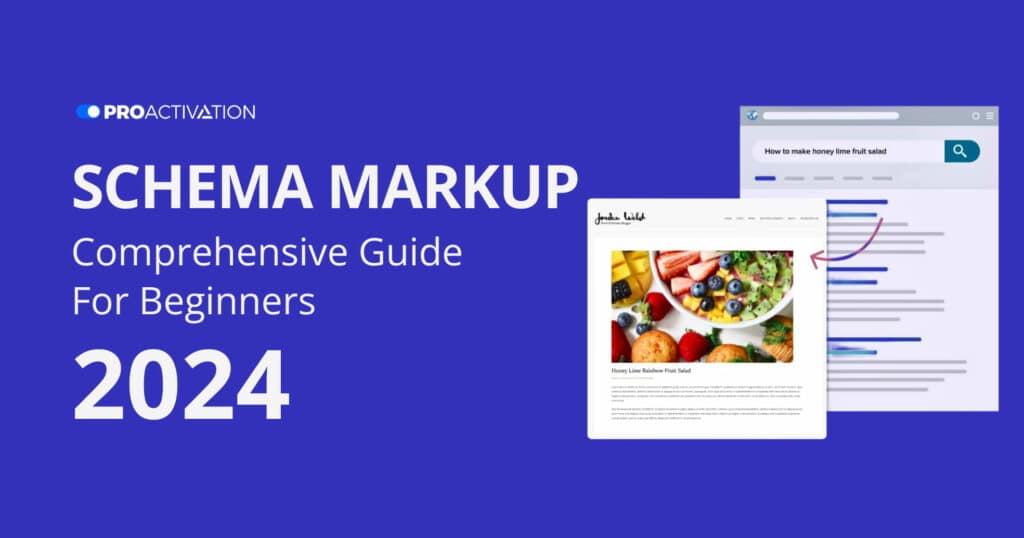Certainly! A website is a great way to be present online, but getting it to appear in search results, especially through the strategic implementation of Schema Markup, is crucial for attracting potential customers.
If you’re like many website owners, you’re constantly seeking ways to improve your site’s visibility on search engines such as Google.
What if we told you there’s a way to communicate with search engines directly?
A method to clarify the real purpose of Optimize your website to secure a superior position in search engine rankings relevant to your content.

Wouldn’t that be useful?
By initiating a direct conversation, you can assist search engines in comprehending your content.
Even better, you can provide them with the details necessary to enhance the visibility of your content in organic search results.
This is precisely what schema markup and structured data can achieve for your website.
In this comprehensive guide about schema markup, we’ll explore several topics, including:
What is structured data and schema markup?
Search engines, like Google, are clever, but their robots still face challenges in fully grasping the context.
For instance, distinguishing whether a specific number represents the review rating for a product or the price of that same product can be tricky for search engines.
Structured data is the solution to this context problem.
It serves as a behind-the-scenes code format.
Enable a means for explicitly communicating with search engines regarding your website content website’s details; it’s like saying, “Hey, this number here is the product rating; we rated it 4.5 stars out of 5. And that other number is the price – it costs $49.99.”
Although your human visitors won’t see the structured data, search engines can read it.
As you’ll discover later on, search engines leverage this information to enhance the visibility and clickability of your site in organic search results.
Is structured data the same as schema markup?
“structured data” and “schema markup” are often used interchangeably but differ.
So, what’s the difference?
Schema markup, found at schema.org, is a specific vocabulary for structured data that all major search engines have unanimously adopted.
It’s like the universal language of the structured data world everyone uses and understands.
Because all major search engines recognize schema markup, it’s considered the most effective way to incorporate structured data into your website.
How does schema markup benefit website SEO?
Adding schema markup to a website offers two main advantages.
- Boosts website SEO:
Search Engine Optimization (SEO) involves Enhance your website to achieve a more prominent presence in search engine outcomes for relevant queries. Schema markup lets you provide detailed information to search engines, helping them better understand your website.
This, in turn, increases the likelihood of your site being displayed for relevant searches. As your website attracts more traffic and engagement, it may gradually climb in rankings, generating more leads and helping you achieve your goals. - Display Rich Search Results:
Schema markup contributes to rich snippets or enhanced search results for your website. Providing search engines with sufficient information creates a distinct presence on the results page, standing out from other listings.
This dedicated space can significantly improve and Boost the prominence and attractiveness of your website in search results.

Take a look at the highlighted rich snippets above. They attract considerable attention, making people more inclined to click on these results compared to others.
What does Schema Markup look like on a website? Is it easy to implement?
To the human eye, a page with schema markup appears no different from one without. However, if you examine the underlying code (what search engines see), you’ll observe something like this:

You need to add that to your site to leverage structured data. But hold on!
This process is simplified with Schema Pro – a tool that allows you to include and incorporate structured data seamlessly without the intricacies of manually coding each page.
Schema Markup helps increase the visibility of your content in search engine results.
While Google has suggested that structured data itself might contribute to higher rankings in the future, no data indicates that adding schema markup directly improves Google rankings.
However, there is evidence that schema markup can enhance the traffic your site receives from Google.
Here’s why:
Structured data empowers Google and various search engines to provide your website with “rich results.”
In Google’s words, ” Rich results transcend the conventional blue link format in search results, incorporating elements such as carousels, images, or other non-textual UI features.”
To put it in simpler terms…
Have you ever noticed those eye-catching star ratings in Google’s organic search results?
That’s an example of rich results.
But rich results go beyond star ratings – various enhancements now fall under the “rich results” category.
Enriched Search Results:
Enriched search results maintain the same basic format as standard Google results but are “enriched” with additional attributes such as:
- Star ratings
- Recipe cook times and calories
- Job details for job postings
- Many other possible additions
For instance, here are some enriched search results for recipes:

The additional details shown in these results depend on the type of content.
For example, a product page will present different information comthanrecipe or a job posting, and over 25 content types are supported by Google.
Knowledge Graph
Google’s Knowledge Graph is the prominent block that appears to the right of Google’s organic search results.
By incorporating structured data on your site, you can impact the information displayed in the Knowledge Graph result, enhancing the completeness of the listing.

Carousels
Carousels serve as a “container for multiple rich results of the same type on your website.”
Depending on the topic, Google may also assemble carousels featuring similar items from various websites.
Carousels provide an opportunity to showcase more of your content in Google’s standard search results, making them an excellent way to enhance your visibility in search.

How do Rich Results Increase Traffic from Search Engine Results?
In simple terms, rich results enhance the visibility of your website in organic search results.
Here’s a straightforward example

If you observe the three results above, the star ratings in the review, positioned in the middle, will likely catch your attention.
Rich results do more than capture a searcher’s attention. They offer additional information to searchers, aiding them in deciding which search result to click on.
It’s essentially a two-pronged approach:
- Firstly, rich results attract readers’ attention by presenting a unique appearance that stands out from the typical blue links.
- Secondly, rich results provide extra information and helpful navigation items to assist readers in determining that your site has the content they’re seeking.
Combining these two aspects increases the likelihood that your site will be clicked on when it appears in the organic search results!
Getting started with Schema Markup Today!
Now that we’ve explored schema markup and how it can benefit your website and business when implemented correctly, you may want to incorporate it into your website.
But here’s the good news – you don’t need to code anything. Schema Pro allows you to effortlessly enjoy the advantages of structured data on your WordPress website.
Inform the plugin about your content, and it will automatically add Google’s preferred JSON-LD structured data. Enhance your website for search engines, augmenting your site’s optimization chances of obtaining those rich results.
Advantages of using Schema Pro:
- Adheres to Google’s latest guidelines and utilizes the latest JSON-LD technology.
- Supports all schema markups endorsed by Google and enables you to add your desired custom schema markup.
- Eliminates the need to implement schema markup individually on each page; it can all be done collectively.
- Ensures accurate schema implementation, which can be verified using the built-in Google Structured Data Testing Tool.
Unlock the power of Schema Pro for just $6.99! Elevate your website’s visibility and SEO effortlessly with our exclusive offer. Don’t miss out on this opportunity to enhance your online presence.
Get Schema Pro now and start optimizing your site for search engines today!
In conclusion,
Navigating the digital landscape requires more than just a website presence; it demands strategic optimization for search engines.
Schema Pro emerges as the beacon guiding website owners to a realm where communication with search engines becomes not just possible but beneficial.
The intricacies of structured data and schema markup, unveiled in this guide, empower website owners to enrich their content, captivate audiences with rich results, and stand out in the competitive online arena.
As you embark on the journey of Schema Markup implementation, remember that Schema Pro is your ally, simplifying the process and ensuring your website speaks the language that search engines understand.
Embrace the advantages, optimize effortlessly, and increase your website’s visibility and engagement. Elevate your online presence with Schema Pro – where visibility meets simplicity.


